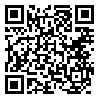2- Assistant Professor of National Population Studies & Comprehensive Management Institute, Tehran, Iran
Sampling hidden populations is challenging due to the lack of convenience statistical frames. Since most populations exposed to special diseases are hidden and hard to reach, sampling methods that produce representative and efficient samples from the populations have become a study subject for researches all over the world. Because of the unknown probability of selecting samples in conventional sampling methods and also invalidity of generalizing the results of non-probability sampling methods to the statistical population, the necessity of introducing probability chain-referral sampling methods, such as the respondent driven sampling method becomes imperative. In this article, besides introducing the respondent driven sampling method, some of the advantages of this method as relative decrease of the bias of estimates, declining the non-response rate by paying incentives and allocating weights proportional to reciprocal of the social network size of respondents to produce unbiased estimates are described. Moreover, some disadvantages of this method such as lack of producing differential samples by selecting similar seeds, lack of reaching more efficient method than snowball sampling by implementing this method improperly and lack of achieving to equilibrium by existing weak social networks among members of interested population are stated. Another aim of this article is to compare sampling methods of hidden population with the respondent driven sampling method which are the results of implementing this method in different surveys and existing simulations.
Received: 2016/08/7 | Accepted: 2016/08/7 | Published: 2016/08/7
| Rights and permissions | |
 |
This work is licensed under a Creative Commons Attribution-NonCommercial 4.0 International License. |


